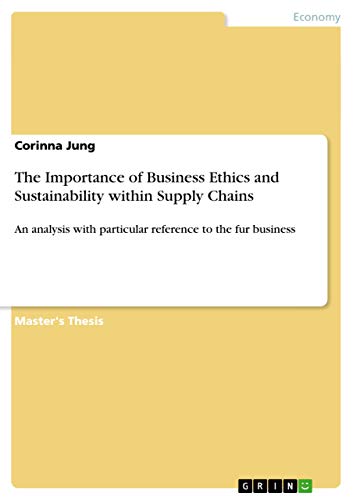The Importance of Business Ethics and Sustainability within Supply Chains: An analysis with particular reference to the fur business - Softcover

"synopsis" may belong to another edition of this title.
- PublisherGRIN Verlag
- Publication date2011
- ISBN 10 3656074291
- ISBN 13 9783656074298
- BindingPaperback
- Number of pages108
Buy New
Learn more about this copy
Shipping:
£ 19.71
From Germany to U.S.A.
Top Search Results from the AbeBooks Marketplace
The Importance of Business Ethics and Sustainability within Supply Chains
Book Description Taschenbuch. Condition: Neu. This item is printed on demand - it takes 3-4 days longer - Neuware -Master's Thesis from the year 2011 in the subject Business economics - Business Ethics, Corporate Ethics, grade: 78 % (1,0), University of Exeter (Business School), course: Strategy/Operations, language: English, abstract: 1. Introduction'Ethics are in vogue' is an assertion drawn after the International Herald Tribune (IHT) conference on luxury (Smale, 2007). The reason for this statement is the presumption of an emergent type of luxury consumer whose purchase decision is up to the ethical behaviour of business. Is this concept mere wishful thinking or does it reflect empirical reality, since the latter would void the expression 'the devil wears Prada'. It is obvious, that the conventional way of economic development not any longer satisfies the needs of the world in which we live - 'the environment is, without doubt, one area which is being subjected to greater public scrutiny' (Dembkowski and Hanmer-Llyod, 1994). Society increasingly requires a healthy living, innovative, efficient and safe technologies as well as a 'stable and safe' natural and social environment (Jochem 2011). The media especially reports on ethical and sustainable business conduct and its affects on 'human health, the ecosystem and future generations' (Bonacchi and Rinaldi, 2006).Simultaneously to the increasing requirements of ethical and sustainable business conduct, the luxury fur demand is substantially growing. From US $ 456.99 million in 2001, the world fur outlook estimates an increase in sales up to US $ 854.13 million in 2011 (Parker, 2005) - fur auction houses sell 'record-breaking' numbers. Fur re-emerges as a fashionable design material; especially younger designers are 'fascinated with fur and use it in innovative ways' (Foreman, 2010). The material has also trickled down to the streets - the younger generation demands it more than ever; even child fashion designers use it for their collections (Vulsier, 2010).The inherent question from these insights is whether both developments, namely an increasing requirement of sustainable and ethical business conduct as well as a growing fur fashion demand, are in line or in contrast to each other. Thus, is a fur producer ethical and sustainable The author aims to gain knowledge whether a fur business responds to these external societal requirements regarding ethics and sustainability and whether ethical and sustainable or unethical and insustainable business conduct implicates advantages or disadvantages.This study will examine the topics ethics and sustainability within a fur business. The research will examine the supply chain sustainability performance and ethicality of a fur producer and trader from a business and consumer perspective. 104 pp. Englisch. Seller Inventory # 9783656074298
The Importance of Business Ethics and Sustainability within Supply Chains : An analysis with particular reference to the fur business
Book Description Taschenbuch. Condition: Neu. Druck auf Anfrage Neuware - Printed after ordering - Master's Thesis from the year 2011 in the subject Business economics - Business Ethics, Corporate Ethics, grade: 78 % (1,0), University of Exeter (Business School), course: Strategy/Operations, language: English, abstract: 1. Introduction'Ethics are in vogue' is an assertion drawn after the International Herald Tribune (IHT) conference on luxury (Smale, 2007). The reason for this statement is the presumption of an emergent type of luxury consumer whose purchase decision is up to the ethical behaviour of business. Is this concept mere wishful thinking or does it reflect empirical reality, since the latter would void the expression 'the devil wears Prada'. It is obvious, that the conventional way of economic development not any longer satisfies the needs of the world in which we live - 'the environment is, without doubt, one area which is being subjected to greater public scrutiny' (Dembkowski and Hanmer-Llyod, 1994). Society increasingly requires a healthy living, innovative, efficient and safe technologies as well as a 'stable and safe' natural and social environment (Jochem 2011). The media especially reports on ethical and sustainable business conduct and its affects on 'human health, the ecosystem and future generations' (Bonacchi and Rinaldi, 2006).Simultaneously to the increasing requirements of ethical and sustainable business conduct, the luxury fur demand is substantially growing. From US $ 456.99 million in 2001, the world fur outlook estimates an increase in sales up to US $ 854.13 million in 2011 (Parker, 2005) - fur auction houses sell 'record-breaking' numbers. Fur re-emerges as a fashionable design material; especially younger designers are 'fascinated with fur and use it in innovative ways' (Foreman, 2010). The material has also trickled down to the streets - the younger generation demands it more than ever; even child fashion designers use it for their collections (Vulsier, 2010).The inherent question from these insights is whether both developments, namely an increasing requirement of sustainable and ethical business conduct as well as a growing fur fashion demand, are in line or in contrast to each other. Thus, is a fur producer ethical and sustainable The author aims to gain knowledge whether a fur business responds to these external societal requirements regarding ethics and sustainability and whether ethical and sustainable or unethical and insustainable business conduct implicates advantages or disadvantages.This study will examine the topics ethics and sustainability within a fur business. The research will examine the supply chain sustainability performance and ethicality of a fur producer and trader from a business and consumer perspective. Seller Inventory # 9783656074298

